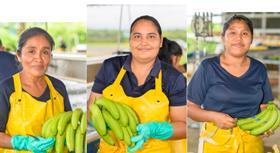
Chiquita used the opportunity of International Women’s Day on 8 March to highlight its commitment to meeting the challenge of equality for women.
In order to address the vulnerability of women to violence, discrimination and intimidation on traditionally male-dominated banana plantations in Latin America, the multinational has developed guidelines, codes of conduct and tools to ensure incidents are eliminated as far as possible and that zero tolerance is shown to such acts.
“Chiquita understands that it is crucial for all employees to be, and feel, safe and to benefit from the best possible working conditions without fear of suffering harassment,” the company said.
“One of the company’s primary aims is to ensure that the voices of all its employees are heard, and that any concerns about inappropriate behaviour can be freely expressed.”
Safeguarding tools
The company has developed a range of unique tools to safeguard women’s rights including a dedicated helpline, available 24/7, 365 days a year, enabling employees to anonymously report any discrimination or harassment in a completely safe and supportive environment.
Company representatives promote this from farm to farm so help can be provided and issues resolved as quickly as possible.
Moreover, a 2001 IUF-Colsiba-Chiquita agreement on workers’ rights was strengthened in 2013 to specifically protect women’s rights, particularly their employment opportunities.
The agreement annex provides an effective additional safeguard to Chiquita’s Collective Labour Agreement in Panama, Costa Rica, Honduras and now Guatemala, where it is currently being implemented.
Women’s advancement
The agreement is also the basis for an information and awareness campaign to advance women’s technical skills, rights, and health and safety, and is regularly reviewed by a dedicated committee to assess the application of the agreement.
“While Chiquita accepts that women remain under-represented within the farms in Latin America, the company is working hard to increase women’s participation,” the company said.
Chiquita highlighted for case studies of women employees: Mayra Noelia Pereira, the first woman to operate mobile cranes in the Puerto Barrios Railroad Port Terminal; agronomy graduate Faustina Madrid who worked her way up to become farm administrator; Nives de Luca, port manager at Oxnard, California; and packing plant supervisor Elizabeth Vargas Hidalgo.
Pink sticker campaign
The multinational also reaffirmed its commitment to supporting the fight against breast cancer through its Pink Sticker campaign.
Since 2017, the colour of the company’s iconic blue sticker changes to pink to mark Breast Cancer Awareness Month, a campaign organised by breast cancer charities each October.
Chiquita is also partnering every year with various associations like Pink Ribbon, American Cancer Society, Girls vs Cancer, etc. in its efforts to undertake research and support patients, survivors and caregivers.



